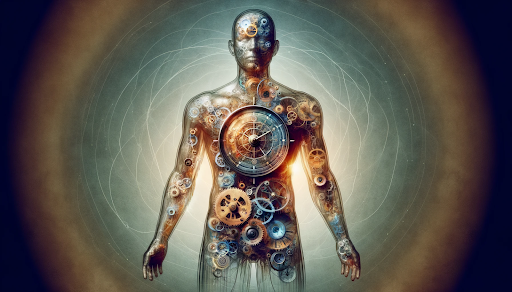Try for free today
The Sleep-Anxiety Conundrum Report

Literally everyone is experiencing anxiety and sleep disturbances in this fast-paced modern life. Nearly 4% of the world population suffer from anxiety at different levels. That’s approximately 320 million people. BUT. Does anxiety cause sleeplessness? Or does lack of sleep cause anxiety?
The relation between sleep and anxiety is a bidirectional one. Meaning anxiety can cause sleeplessness and lack of sleep can cause anxiety. But how do we know that? We explored several studies to understand this complicated relation. And we found out some exciting facts related to the relation between sleep and anxiety.
Alora presents: The Sleep-Anxiety Conundrum Report
In this Sleep-Anxiety Conundrum report, we have analysed various studies which were conducted to understand the relation between anxiety and sleep. It turns out, even sleep deprivation can cause you to feel anxious.
Our objective is to present those findings in a cohesive manner so we can better understand how we can tackle sleep and anxiety issues. Plus, there is a helpful way mentioned in the end which can help you sleep even if you have anxiety or sleep disorders!
Upon learning about these facts and data related to the complex relation between sleep and anxiety, we are determined more than ever to help you get a good night’s sleep!
Isn’t this a worrisome trend?
Yes
No
What do the numbers on anxiety look like in the U.S.?
Being one of the fastest developing countries, the number of adults affected by anxiety does not look good in the U.S. Young adults are seen to be more affected than older adults.
And what about sleep disorder in the U.S.?
Sleep disorders in the U.S. are a prevalent health concern, affecting a substantial portion of the population. Among these, insomnia, sleep apnea and narcolepsy are some of the most common ones. However, it’s not always so severe. Sleep deprivation occurs temporarily as well.
Top 3 Sleep-Anxiety trends explored
After looking at studies conducted to understand the complex relation between sleep and anxiety, we have found 3 common trends.
Sleep-Anxiety Trend #1: Sleep disorders are more likely to occur in people with anxiety

Many studies have found that anxiety does affect sleep and people with anxiety disorders are at a high risk of sleep disorders like insomnia. Meaning people with anxiety have a higher chance of experiencing sleep disorders. Here are some of the studies that have supported the fact that anxiety causes you to lose sleep.
Key Findings:
Do you think you would remember these stats the next time you are anxious?
Yes
No
Sleep-Anxiety Trend #2: Poor sleep can worsen anxiety

Inadequate or disrupted sleep can intensify feelings of restlessness, nervousness and worry. In short, cause you to be more anxious. If you already suffer from anxiety then getting poor sleep can further worsen your condition. However, it does not mean that lack of sleep will always cause anxiety. But are more likely to worsen your condition. Here are some of the studies which have unearthed what poor sleep can do to your anxiety.
Key Findings:
Sleep-Anxiety Trend #3: Sleep and Anxiety share a reciprocal relationship

As we had mentioned before, sleep and anxiety share a reciprocal relationship. And one can cause the other. We already know that poor sleep can affect our mental health. And these two share a close association with each other. Here are some of the studies which have tried to understand this reciprocal relation between sleep and anxiety.
Key Findings:
There’s one thing we’re sure of and that is, getting a good night’s sleep can prevent most kinds of mental health issues like anxiety and depression.
Haven’t we normalised being anxious?
One thing is for sure, anxiety has become a part of our lives and we use the term “anxiety” quite casually each time we’re describing our mental health. It’s like we’ve accepted and normalised anxiety. Being anxious has become the new norm. Now, most of the time we can’t help being anxious. We’ll always face certain situations that’ll make us feel anxious. Yes you can tone it down with yoga, meditation and other lifestyle changes. But sometimes we can’t really control it.
Anxiety just creeps into our lives like an unwelcome guest. The next thing we know, we’re losing our precious sleep because of anxiety. It’s mental health we’re dealing with. And the sad thing is we lose sleep and we don’t even realise why. But the good news is, sleep technology is here to help you get a better sleep.
Can’t Sleep? Here’s a solution accepted by a million+ people
You might not be able to always control feeling anxious. BUT. You can always control your sleep! Whether you’re facing any mental health issue like anxiety or not, it is important to get a good night’s sleep. And you can always have one!
Remember when we were young and our loved ones would read our favourite stories to help us fall asleep? And within a few minutes, we’re snoring! Well, you can do it as an adult too! Alora app acts as your loved one to tell bedtime stories and a great number of people around the world have benefitted from these.
At Alora, we have bedtime stories specially created to help you fall asleep faster and get a good night’s sleep. And wake up the next morning feeling fresh and well rested!
References
https://www.nimh.nih.gov/statistics/anxiety-disorder
https://www.cdc.gov/databriefs
https://www.ncbi.nlm.nih.gov/articles
https://www.sciencedirect.com/article
https://academic.oup.com/sleep/article
Latest Reports and Studies

The Myth of Sleep as Wasted Time
Did you know that a significant number of Americans think sleep is a waste of time? In this report we're going to discuss just that...

4 Overlooked Effects of a Disrupted Circadian Rhythm
From the time light was invented, we’ve become a 24 hour society. The boundaries separating night and day have blurred...
A Proven Hack for Sleep Alora
78% of users reported reduced anxiety with our sounds. Listen now.
Soft Rain
00:00
00:00
Found it interesting?
Try Alora today
